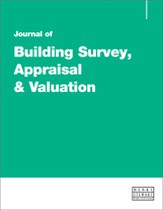The impact of energy policy on traditional buildings: Towards a holistic decision-making framework for retrofitting: Part 2
Abstract
The Energy Performance of Buildings Directive (EPBD) is the European Union’s main policy instrument for reducing the built environment’s contribution to climate change. Energy Performance Certificates (EPC) are a tool of this policy, providing buildings with a performance rating. In the UK these have become the benchmark by which the Minimum Energy Efficiency Standards (MEES) are judged, rendering residences lower than an E illegal to rent out. This has pushed property owners to undertake energy retrofitting interventions to ensure compliance. In traditional buildings this is potentially problematic. Buildings of this type rely on permeability to control moisture dynamics; the insertion of less permeable barriers can interrupt their internal hygrometry leading to condensation, damp and decay. As a result, subsequent damage to the building fabric can bring energy policy into conflict with heritage conservation. Existing frameworks that attempt to mitigate the tension within these agendas often fall short in explicitly considering the the problem holistically. This research first asks if pressure from policy is leading to incompatible retrofits. Secondly, it aims to develop a holistic framework that unites heritage and energy agendas with current policy. An inductive, pragmatic approach was undertaken. Using a historic estate’s residential portfolio as a case study, condition surveys were carried out to assess whether properties retrofitted with secondary glazing were experiencing problems with condensation. The results of this were significant, supporting the argument that energy policy is driving incompatible retrofitting interventions. Exploratory data analysis was carried out on an existing EPC dataset to highlight inconsistencies with the EPC methodology. Finally, these findings were combined with questionnaire survey results, targeted at both professionals and occupants, to inform a decision-making framework that incorporated energy efficiency, heritage values, life cycle cost analysis (LCC), building assessment, occupant behaviour, with a feedback loop promoting a bottom-up approach to policy. This issue contains Part 2 which will deal with the methodology and results. Part 1 in the previous issue set the scene.
The full article is available to subscribers to the journal.
Author's Biography
Russell Frew is a Senior Design and Heritage Officer in the Conservation and Design Team at the Royal Borough of Kensington & Chelsea. His work sees him advising on and providing consent for changes to listed buildings and conservation areas in one of the most heritage-rich boroughs in the country. He holds an MSc in building surveying and qualifications in both architectural history and conservation. Russell has previously worked as both a Buildings Adviser at the Diocese of London, delivering construction projects and administering permissions and for Faithful & Gould in a building surveying capacity, demonstrating broad experience across the conservation and built environment sector.
Citation
Frew, Russell (2024, March 1). The impact of energy policy on traditional buildings: Towards a holistic decision-making framework for retrofitting: Part 2. In the Journal of Building Survey, Appraisal & Valuation, Volume 12, Issue 4. https://doi.org/10.69554/DOTI1042.Publications LLP
